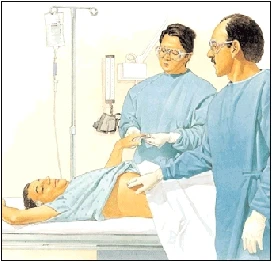During a liver biopsy, a needle is inserted through the skin (percutaneous) and into the liver. A small sample of liver tissue is then removed and sent to a lab to be examined.
Before the liver biopsy, ask your doctor any questions you have.

During the Procedure
- After changing into a hospital gown, you lie on your back or your left side. Part of your body is draped.
- Your blood pressure, pulse, breathing, and temperature are checked.
- A sedative may be given through an IV (intravenous) line.
- A small syringe is inserted through a tiny incision.
- A small sample of liver tissue is taken out. While this is done, you will be told to hold your breath. The needle is removed.
- A bandage is placed over the incision site. You may be asked to lie for a while on your right side. A pillow or special sandbag may be used to apply pressure to the incision site.
- You will be monitored for a few hours after your biopsy.
After the Procedure
Have someone drive you home after your liver biopsy. You may feel some pain near the biopsy site or in your right shoulder. Get plenty of rest. Avoid alcohol, aspirin, heavy lifting, and exercise for a few days. Follow your doctor’s advice.
GETTING YOUR RESULTS
Getting your biopsy results may take a few days. When the results are ready, your doctor can discuss them with you.
When to Call Your Doctor
Call your doctor right away if you have any of the following:
- Severe pain near the biopsy site or in the abdomen or chest
- Fainting or feeling lightheaded
- Trouble breathing
- Fever
- Bleeding from the incision site
